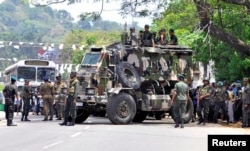Sri Lankan President Maithripala Sirisena on Tuesday declared a nationwide state of emergency for seven days in a bid to curb communal violence after clashes erupted between majority Buddhists and members of the Muslim minority.
Under the emergency, which was imposed for the first time since 2011, following the end of the civil war with Tamil separatists two years before that, security forces can carry out searches without warrant and detain suspects without charges.
The move came after police said Sinhalese mobs targeted the properties of minority Muslims in eastern and central Sri Lanka, incensed by the death of a Sinhalese truck driver after a clash with Muslim youths in the central Kandy district on Sunday.
Some people were instigating violence through Facebook, the government said, warning of tough action against them.
"The president has instructed the police to impartially, comprehensively and promptly deal with those engaged in criminal activities and those causing or attempting to cause ethnic and religious tensions, irrespective of their ethnic or religious identities and political affiliations," said a statement issued by Sirisena's office.
Tension has been growing between the two communities in Sri Lanka over the past year, with some hardline Buddhist groups accusing Muslims of forcing people to convert to Islam and vandalizing Buddhist archaeological sites.
Some Buddhist nationalists have also protested against the presence in Sri Lanka of Muslim Rohingya asylum-seekers from mostly Buddhist Myanmar, where Buddhist nationalism has also been on the rise.
Prime Minister Ranil Wickremesinghe told parliament that "political groups" he did not identify were trying to incite hatred against Muslims.
Muslims make up about 9 percent of Sri Lanka's 21 million people. Buddhists make up about 70 percent and ethnic Tamils, most of whom are Hindus, about 13 percent.
Analysts say the government has been alarmed by the speed with which the trouble spread in two districts of Kandy and sought to contain it through the imposition of emergency.
Postings have appeared on Facebook threatening more attacks on Muslims.
The unrest in Kandy began on Sunday after the funeral of the Sinhalese truck driver, the government said.
It was not clear why the initial altercation occurred, but after the driver's funeral on Monday, a Sinhalese mob attacked Muslim shops, police said. Early on Tuesday the body of a Muslim youth was found in a burned-out shop, police said.
Area residents have said more than 30 shops and houses have been damaged while scores of mosques also have been attacked since the government imposed a curfew on Monday. Police reimposed the curfew until 0600 hours (0030 GMT) Wednesday.
The U.S. Embassy in Sri Lanka said it was important that the government act quickly against perpetrators of sectarian violence, and protect religious minorities and their places of worship. It also asked for an early lifting of the emergency.






